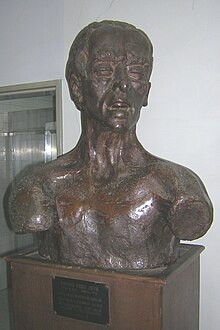Porfirio Barba Jacob
Porfirio Barba Jacob , actually Miguel Ángel Osorio Benítez (born July 29, 1883 in Santa Rosa de Osos , Dept. Antioquia , † January 14, 1942 in Mexico City ), was a Colombian writer.
Barba Jacob was a son of Antonio M. Osorio and his wife Pastora Benítez. In addition to his most important pseudonym "Porfirio Barba Jacob", Osorio also used the code names "Ricardo Arenas" and "Maín Ximénez".
1897 Barba Jacob came to Medellin to attend the local university to study education. After a short time he broke off his studies without a degree and switched to the Universidad Nacional de Colombia to take law studies there. He also dropped out of this course after a short time without a degree. He was then able to earn his living as an assistant teacher in Angostura for some time.
In 1901 Barba Jacob took part in the Civil War, but then deserted home. In Bogotá he founded the literary magazine "Cancionero de Antioqia" and tried in vain to keep it going. When his grandmother died, he went to Cuba and later settled in Mexico . There in Monterrey , Barba Jacob founded the magazine "Contemporánea" in 1909 and was editor-in-chief of the newspaper "El Espectator" for his living. As such, Barba Jacob was among the last of the faithful to defend President Porfirio Díaz before the revolution .
When Ciudad Juárez was conquered by Francisco Madero in the spring of 1911 , Barba Jacob went to the USA and later settled in Cuba again for some time. From there he went back to Mexico after a long stay in Puerto Rico . There he founded the newspaper "Churubusco" in 1914 and published regularly as a freelancer for the newspaper "El imparcial" diatribes against President Plutarco Elías Calles . After he was expelled from the country by the latter, he wandered through several countries in Central America.
In El Salvador , Barba Jacob was accused of immorality and expelled from the country for political subversion . In Guatemala he was under suspicion of murder because the real killer was called Ricardo Arenas , like his pseudonym . Barba Jacob put this name off and called himself Porfirio Barba Jacob throughout his life .
In 1919 he settled in Monterrey and later in Guadalajara . President Álvaro Obregón became aware of Barba Jacobs political newspaper articles and in 1921 appointed him director of the Mexican national library . In 1926 he resigned this office and went to Lima . There he took over as editor-in-chief of the newspaper "La Prensa", the unofficial party newspaper President Augusto B. Leguía y Salcedo . In mid-1927, Barba resigned Jacob and returned to his native Colombia.
He could not gain a foothold there either and so he settled in Mexico City in the spring of 1930. He continued to work as a freelancer for various newspapers and magazines, but was already sick during this time. At the age of 58, Barba Jacob died lonely and impoverished on January 14, 1942 in Mexico City and found his final resting place on the Rotonda de las personas ilustres in the Panteón de Dolores cemetery .
Quote
Dieter Reichardt reports in his work "Latin American Authors" (see below) about Porfirio Barba Jacb:
- In literary history, his poetry marks the last phase of Colombian modernism , which was introduced by JA Silva's delicate, thought-deep poetry and reached its climax in G. Valencia's artfully elaborate sterility. Without fully achieving Valencia's perfection, O. takes up the wealth of modernist forms. His themes of love, sin, lust, pain, fear, and loneliness, on the other hand, refer to romanticism and decadence of Baudelaire's style - but more clearly to his own life and his deeply romantic personality.
Works (selection)
- La canción de la vida profunda y otros poemas . 19237.
- Canciones y elegías . 1932/33.
- El corazón iluminado . 1942.
- Poemas intemporales . 1943.
- Poesías completas . 1960.
- Rosas negras . 1933.
literature
- Beatriz Cuberos de Valencia: Porfirio Barba Jacob . Proculturo, Bogotá 1989, ISBN 958-9043-67-4 .
- Enrique Foffani: Las máscaras del poeta. Sobre la poesía de Porfirio Barba Jacob. In: Orbis tertius. Revista de teoría y crítica literaria , Vol. 2 (1997), No. 5, pp. 117-127.
- Kurt Levy: Porfirio Barba-Jacob. Nostalgia for the vida. In: Thesaurus de Bogotá , Vol. 44 (1989), Issue 1, pp. 83-91.
- Virgilio López Lemus: Modernismo y postmodernismo. Dos grandes poetas colombianos, Guillermo Valencia y Porfirio Barba-Jacob. In: Estudios de literatura colombiana , Vol. 5 (1999), pp. 23-32.
- Rómulo Naranjo Naranjo: Porfirio Barba-Jacob. In: Con-textos. Revista de aemiótica literaria , Vol. 24 (1999), pp. 56-99.
- Dieter Reichardt: Latin American authors. Literary dictionary and bibliography of German translations . Erdmann Verlag, Tübingen 1972, ISBN 3-7711-0152-2 , pp. 367-368.
- Eduardo Santa: Porfirio Barba-Jacob y su lamento poético Editorial Caro y Cuervo, Bogotá 1991.
- Rafael H. Valle: Bibliografía de Porfirio Barba-Jacob . Mexico 1961.
| personal data | |
|---|---|
| SURNAME | Barba Jacob, Porfirio |
| ALTERNATIVE NAMES | Osorio Benítez, Miguel Ángel (real name) |
| BRIEF DESCRIPTION | Colombian writer |
| DATE OF BIRTH | July 29, 1883 |
| PLACE OF BIRTH | Santa Rosa de Osos , Antioquia , Colombia |
| DATE OF DEATH | January 14, 1942 |
| Place of death | Mexico City , Mexico |
